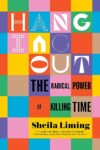While others continue to distract themselves with work, television, and the occasional book, the unnamed narrator of Lee Rourke’s debut novel, The Canal, has resigned from his unremarkable job to loiter full-time at a local towpath. His goal is to embrace boredom, but this takes a backseat when he is joined by a gang of violent teens and a young woman made of secrets and lies.
Unlike a traditional flâneur, idly roaming the city, Rourke’s narrator sits down and lets the city come to him. Overhead, planes trail each other to the nearby runways while, across the canal, a man in an office walks back and forth between desks. Swans go through similar motions on the water below while a homeless woman by the bench asks, over and over, “Do you like the canal, then? Do you like the canal, then?” But there’s more to boredom than routine. Terrorism, gang violence, and gentrification also pass by, obscuring the canal like floating debris.
Drama rises from our aversion to boredom, the narrator asserts, and if we could only eschew our distractions and embrace our boredom, many of our problems would fall away. Rourke complements this asceticism with a pared-down style in which vocabulary is limited, memories are incomplete, and observations are qualified with maybe and probably. These spare pieces can coalesce to form moments of surprising tension for a novel about boredom, but the final picture still has many cracks.
Passages begin to drag when Rourke attempts to expand his ideas (though, to be fair, one of them is that time should drag), and by the end of the novel, the ubiquitous planes and swans are so loaded with significance that they seem on the verge of plummeting from the sky and sinking to the bottom of the canal. Characters are forever repeating catchphrases as they walk back and forth, but unlike the repetitive flow of water, which can both deposit and erode, the novel’s mantras neither build nor deconstruct, and with no variation, you’re likely to skip the fourteenth iteration of “Do you like the canal, then?”
The narrator has a disdain for televisions, cellphones, and any other invention that speeds time and hastens our deaths. But as he sits and watches it all go by, it’s easy to imagine him doing the same thing at home, monitoring his Twitter feed or watching the TV Guide channel — maybe even reading a book. After all, canals, like televisions, are man-made.
This post may contain affiliate links.








